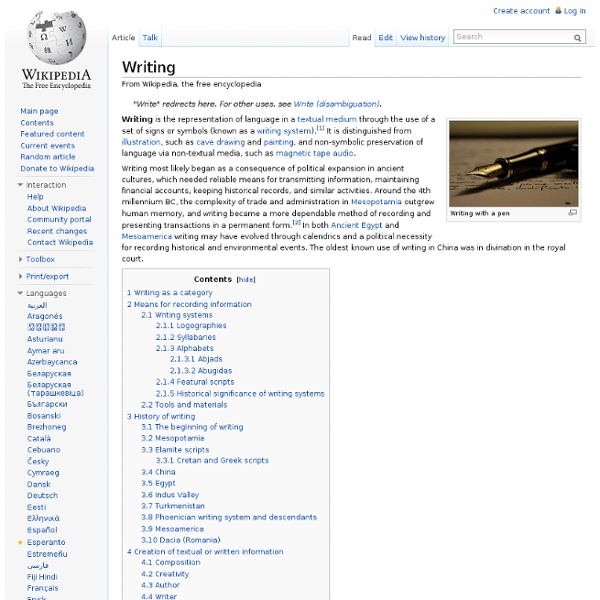English Listening
Dragon Writing Prompts :: Character traits :: September :: 2007
Here’s an extensive list of character traits. You can pick a couple or three to form the basis of a character. Then create a character with the opposite traits to form a friend, enemy, sibling, mentor … ? While there’s a great deal to be said about nature forming our characters, it’s a lot more interesting for a story if there’s a background reason! Pick all from one list or all from different lists or mix them up and choose completely randomly. If you love lists, there’s another list: Raymond Cattell’s 16 Personality Factors . Positive traits Depends on the context whether they’re positive or negative Generally negative descriptors, but not aspects that make you want to keep your distance Quite negative, people you want to have as little contact with as possible Pretty darn evil Abusive Cruel Dishonest Hateful Inhumane Masochistic Psychopathic Psychotic Ruthless Sadistic Traitorous Tyrannical Vengeful Wicked
Performance
Performance en la Avenida Reforma de la Ciudad de México. Una performance o acción artística es una muestra escénica, muchas veces con un importante factor de improvisación, en la que la provocación o el asombro, así como el sentido de la estética, juegan un papel principal. Concepto[editar] El término performance se ha difundido en las artes plásticas a partir de la expresión inglesa performance art con el significado de arte en vivo. Está ligado al Happening, al movimiento Fluxus, al Body art y, en general, al arte conceptual. La performance se opone a la pintura o la escultura, ya que no es el objeto sino el sujeto el elemento constitutivo de la obra artística. El sniggling es una forma activista y engañosa de performance art en público, que típicamente se desarrolla de modo que los espectadores no se den cuenta, inicialmente, de que se está ejecutando una performance. Historia[editar] Joseph Beuys (1921-1986) fue un importante exponente del performance. Véase también[editar]
Scripped - Free Screenwriting Software
English Language Cinema - AngloINFO Barcelona, in the Barcelona region (Spain)
There are cinemas in Barcelona and the surrounding area that show English language films with Spanish or Catalan subtitles, but most films tend to be dubbed (doblado). They are shown as VO (versione originale) films. When looking for films screened in English, look for the marking "VO" beside the showing. Note: VO films are not always in English. To find out about a film and its language, use the title search option of the Internet Movie Database (IMDb). Some cinemas advertising VO films show the film in Spanish but transmit the original version language soundtrack via headphones. To search for films showing in Spain, see: English-Language Movies Now On To find out what's showing in VO today and later this week, see the AngloINFO Cinema Guide (updated weekly on Fridays). Regional Cinemas Showing English-language Films Icaria-Cinema Cineplex (in Spanish) At: C/ Salvador Espriú, 61, Ctro.
References for Writers
Search libraries in your neighborhood, or pretty much anywhere else, with WorldCat.Here's an excellent source for common errors in English. Wordnik intends to learn everything about every word, ever! This just might be my very favorite word site of all.When Web searching, try Vivisimo, a site that clusters search results by category, making it MUCH easier to find exactly what you're looking for. , similar (though not quite as cool) to the above, is an on-line lexical reference system whose design is inspired by current psycholinguistic theories of human lexical memory. Here’s a nifty Electronic Dictionary of the Irish Language.Read Print offers thousands of free books for students, teachers, and the classic enthusiast. Names and Forms of Address Here is a guide to first names and meanings, and here is one for last names. Quotations Writing Various Genres Drama and Screenwriting:Essays on the Craft of Dramatic Writing collects short original pieces on writing, especially screenplays.
Demonstration
Demonstration may refer to: Music[edit] Sports[edit] Demonstration sport, a sport which is played to promote it, most commonly during the Olympic GamesExhibition game, a sporting event with no competitive value to any competitor See also[edit]
Tsunami
A tsunami (plural: tsunamis or tsunami; from Japanese: 津波, lit. "harbour wave";[1] English pronunciation: /suːˈnɑːmi/ soo-NAH-mee or /tsuːˈnɑːmi/ tsoo-NAH-mee[2]) is a series of water waves caused by the displacement of a large volume of a body of water, generally an ocean or a large lake. Earthquakes, volcanic eruptions and other underwater explosions (including detonations of underwater nuclear devices), landslides, glacier calvings, meteorite impacts and other disturbances above or below water all have the potential to generate a tsunami.[3] The Greek historian Thucydides suggested in his late 5th century BC, History of the Peloponnesian War, that tsunamis were related to submarine earthquakes,[5][6] but the understanding of a tsunami's nature remained slim until the 20th century and much remains unknown. Etymology The term tsunami comes from the Japanese 津波, composed of the two kanji 津 (tsu) meaning "harbour" and 波 (nami), meaning "wave". History Generation mechanisms Seismicity where



